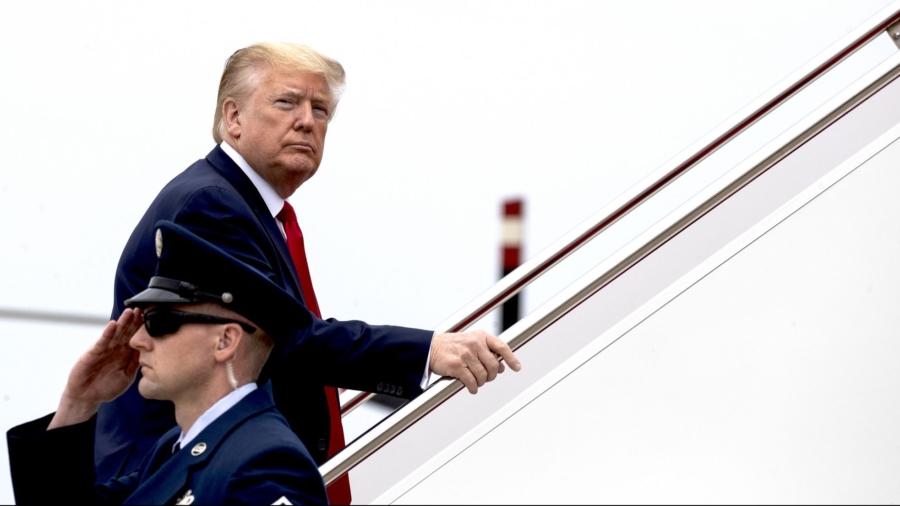President Donald Trump said on May 21 the United States would react strongly if China follows through on plans to impose a new national security law on Hong Kong. Critics say the move would further erode the city’s autonomy and allow the regime to crack down on dissident voices under the pretext of safeguarding security.
Zhang Yesui, spokesperson for the regime’s rubber-stamp legislature, the National People’s Congress (NPC), announced on May 21 evening that the body will propose a bill to “establish and improve the legal system and enforcement mechanism for safeguarding the national security in the Hong Kong Special Administrative Region.”
“If it happens, we’ll address that issue very strongly,” Trump told reporters Thursday before leaving the White House.
Further details of the law will be released on Friday, Zhang added. Hong Kong media outlets, citing insider sources, reported that the legislation would ban secession, terrorism, foreign interference, and other external interference that could pose threats to the regime’s power. The measure could be headed for a formal vote next Thursday and take effect as early as August, local media reported.
The bill, which would allow the regime to bypass Hong Kong’s legislature, is all but guaranteed to be passed given the NPC’s role as a ceremonial rubber-stamp to dictates promulgated by the Chinese Communist Party.
Pro-democracy lawmakers and activists in Hong Kong condemned Beijing’s latest move and pledged protest action.
“This is the end of Hong Kong,” said local lawmaker Dennis Kwok at a press conference on Thursday night. “This is the end of ‘One Country, Two Systems,’” referring to the framework Beijing promised to rule Hong Kong upon the city’s transfer of sovereignty from British to Chinese rule in 1997.
“Make no mistake about it—I foresee that the international status for Hong Kong as a city, an international city will be gone very soon,” Kwok continued. “And that has all to do with Beijing’s walking back and breaching its promise to the Hong Kong people.”
Hong Kong previously scrapped proposals to enact Article 23, an anti-subversion bill, after Hongkongers protested that it would further allow Beijing to erode the city’s autonomy and threaten people’s civil liberties.
First proposed in 2003, Article 23 was shelved in July that year after hundreds of thousands came out in protest. From time to time, pro-Beijing lawmakers in Hong Kong’s legislature have suggested reintroducing the bill.
The city is still reeling from mass protests last year against a now-scrapped extradition bill that would have allowed the Chinese regime to transfer people in Hong Kong for trial in courts controlled by the Chinese Communist Party.

In the past few weeks, Hong Kong police arrested over 200 pro-democracy demonstrators, while brawls between pro-Beijing and pro-democracy lawmakers have broken out in the legislature amid deepening fears that the regime is tightening control over the city.
Prominent local activist Joshua Wong wrote on Twitter: “Although the law is highly contentious in Hongkong, and widespread backlash broke out when [Hong Kong government] introduced the law in 2003, Beijing this time deliberately chooses to ram through this unpopular law by completely ignoring the will of Hongkongers.”
He said the move has “deadly” implications and saw it as a direct retaliation to the protest movement last year.
“Beijing is attempting to silence Hongkongers’ critical voices with force and fear,” he said.
Johnny Patterson, director of U.K.-based advocacy group Hong Kong Watch, agreed, citing concerns that vague national security charges could allow the Chinese authorities to impinge on human rights and suppress dissidents at will.
“Will NGOs and charities like Amnesty International and Hong Kong Watch become illegal?” he asked. “Will the political opposition be accused of subversion? A broad-brush interpretation of this law would signal the end of Hong Kong as we know it.”
U.S. lawmakers were also swift to denounce the plan.
“China made an agreement to allow Hong Kong to remain autonomous until 2047. Now, it’s attempting to take control over the people of [Hong Kong],” Sen. Marsha Blackburn (R-Tenn.) wrote on Twitter.
Last year, Congress passed the Hong Kong Human Rights and Democracy Act, by overwhelming majority. Signed into law in late November, it requires the State Department to certify annually whether Hong Kong is “sufficiently autonomous” to warrant the special U.S. trading privileges distinguishing it from mainland China. Referring to the law, she said “any erosion of Hong Kong’s autonomy will result in decisive action.”

U.S. Secretary of State Mike Pompeo said on May 6 he was delaying the release of this report to take into account any actions at the NPC.
Sen. Josh Hawley (R-Mo.), responding to Beijing’s announcement, said he will introduce a resolution to the Senate later today to stop “this attempted crackdown [and] call on all free nations to stand with Hong Kong.”
“China saying it wants to “improve” Hong Kong by stripping all its people’s rights [and] liberties,” he wrote in a tweet. “This is exactly how China wants to ‘improve’ the world. USA must say NO.”
From The Epoch Times

